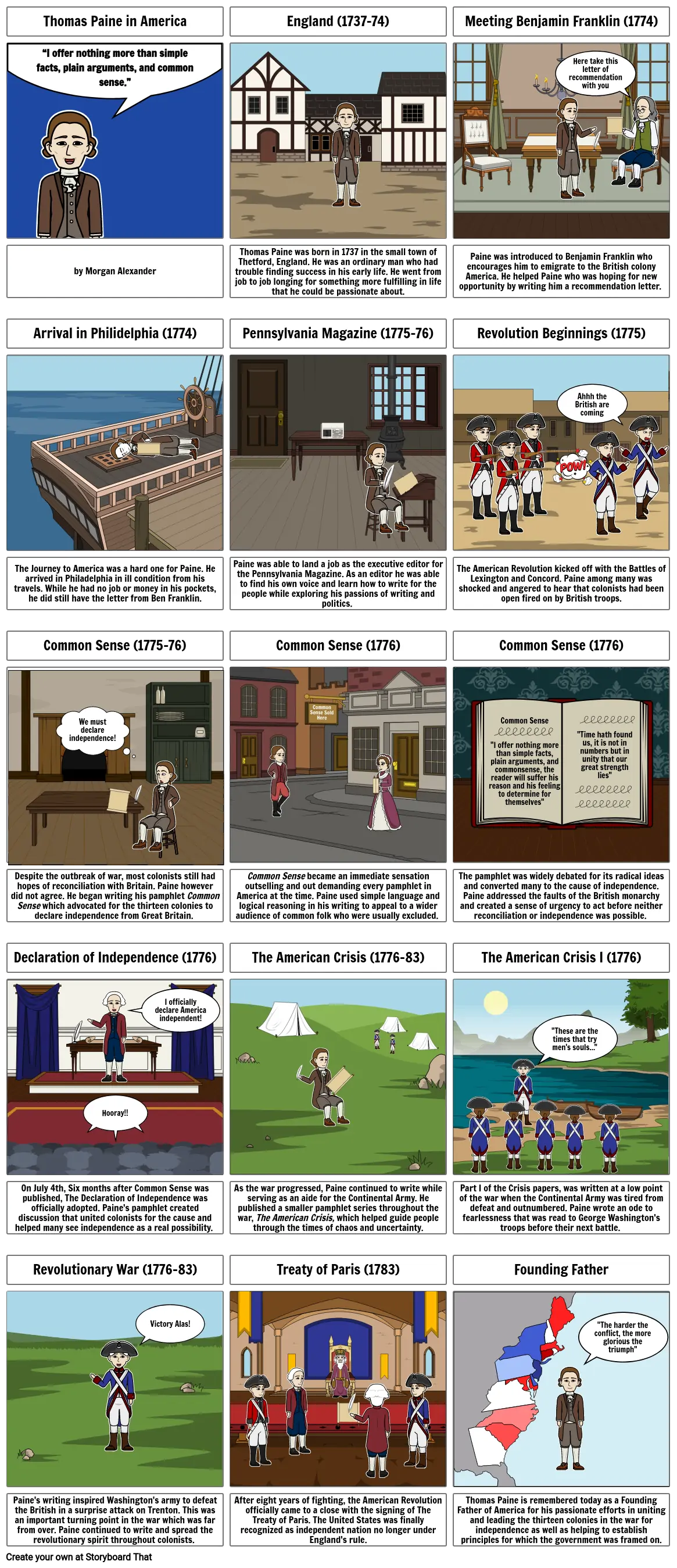Thomas Paine in America

Storyboard Text
- Thomas Paine in America
- “I offer nothing more than simple facts, plain arguments, and common sense.”
- England (1737-74)
- Meeting Benjamin Franklin (1774)
- Here take this letter of recommendation with you
- by Morgan Alexander
- Arrival in Philidelphia (1774)
- Thomas Paine was born in 1737 in the small town of Thetford, England. He was an ordinary man who had trouble finding success in his early life. He went from job to job longing for something more fulfilling in life that he could be passionate about.
- Pennsylvania Magazine (1775-76)
- Paine was introduced to Benjamin Franklin who encourages him to emigrate to the British colony America. He helped Paine who was hoping for new opportunity by writing him a recommendation letter.
- Revolution Beginnings (1775)
- Ahhh the British are coming
- The Journey to America was a hard one for Paine. He arrived in Philadelphia in ill condition from his travels. While he had no job or money in his pockets, he did still have the letter from Ben Franklin.
- Paine was able to land a job as the executive editor for the Pennsylvania Magazine. As an editor he was able to find his own voice and learn how to write for the people while exploring his passions of writing and politics.
- The American Revolution kicked off with the Battles of Lexington and Concord. Paine among many was shocked and angered to hear that colonists had been open fired on by British troops.
- Common Sense (1775-76)
- We must declare independence!
- Common Sense (1776)
- Common Sense Sold Here
- Common Sense (1776)
- Common Sense"I offer nothing more than simple facts, plain arguments, and commonsense, the reader will suffer his reason and his feeling to determine for themselves"
- "Time hath found us, it is not in numbers but in unity that our great strength lies"
- Despite the outbreak of war, most colonists still had hopes of reconciliation with Britain. Paine however did not agree. He began writing his pamphlet Common Sense which advocated for the thirteen colonies to declare independence from Great Britain.
- Declaration of Independence (1776)
- I officially declare America independent!
- Common Sense became an immediate sensation outselling and out demanding every pamphlet in America at the time. Paine used simple language and logical reasoning in his writing to appeal to a wider audience of common folk who were usually excluded.
- The American Crisis (1776-83)
- The pamphlet was widely debated for its radical ideas and converted many to the cause of independence. Paine addressed the faults of the British monarchy and created a sense of urgency to act before neither reconciliation or independence was possible.
- The American Crisis I (1776)
- On July 4th, Six months after Common Sense was published, The Declaration of Independence was officially adopted. Paine's pamphlet created discussion that united colonists for the cause and helped many see independence as a real possibility.
- Hooray!!
- As the war progressed, Paine continued to write while serving as an aide for the Continental Army. He published a smaller pamphlet series throughout the war, The American Crisis, which helped guide people through the times of chaos and uncertainty.
- Part I of the Crisis papers, was written at a low point of the war when the Continental Army was tired from defeat and outnumbered. Paine wrote an ode to fearlessness that was read to George Washington's troops before their next battle.
- "These are the times that try men's souls..."
- Revolutionary War (1776-83)
- Victory Alas!
- Treaty of Paris (1783)
- Founding Father
- "The harder the conflict, the more glorious the triumph"
- Paine's writing inspired Washington's army to defeat the British in a surprise attack on Trenton. This was an important turning point in the war which was far from over. Paine continued to write and spread the revolutionary spirit throughout colonists.
- After eight years of fighting, the American Revolution officially came to a close with the signing of The Treaty of Paris. The United States was finally recognized as independent nation no longer under England's rule.
- Thomas Paine is remembered today as a Founding Father of America for his passionate efforts in uniting and leading the thirteen colonies in the war for independence as well as helping to establish principles for which the government was framed on.
Över 30 miljoner storyboards skapade

